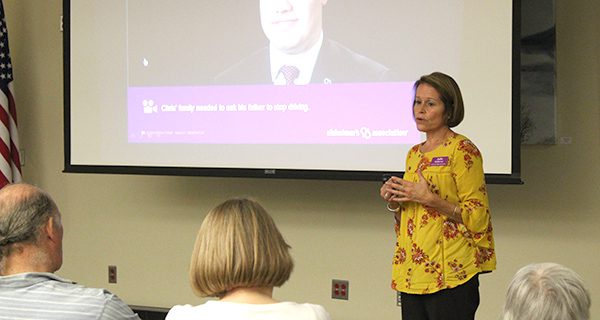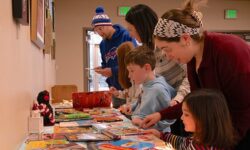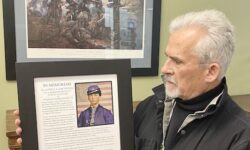[ccfic caption-text format="plaintext"]
By Laura Drinan
Hometown Weekly Reporter
Alzheimer’s is one of those cruel and heartbreaking diseases that has an impact on more than just the person suffering from it. It affects the lives of family and friends, too. While there is not yet a cure for Alzheimer’s and dementia, Julie McMurray from the Alzheimer’s Association came to the Walpole Public Library on October 10 for “Conversations about Dementia,” a program that helps address how to handle the condition.
The program, sponsored by the Friends of the Walpole Library, aimed to clear misconceptions about dementia, facilitate talking about symptoms with a loved one, and discuss how to help a friend or family member with a diagnosis.
“I think education is absolutely key when you’re dealing with any disease process. Knowledge is power and when if you are proactive, that’s really good, rather than being reactive and waiting for something to happen in order to address it,” said Julie, whose own father suffered from vascular dementia.
To begin, Julie discussed the difference between dementia and Alzheimer’s, as they are often mistakenly interchanged. “Dementia, in and of itself, is not a disease process. Dementia is not a diagnosis,” said Julie. It describes symptoms, like short-term memory loss, impaired judgment, difficulty with language, misplacing things, inability to retrace steps, and mood changes.
“Under that umbrella word, dementia, there are many illnesses that cause those dementia symptoms. Alzheimer’s is the most common form of dementia,” Julie informed the audience. “It’s estimated that about 70% of all dementias are of the Alzheimer’s type.”
No matter the disease that provokes dementia, it is crucial for families to know when and how to have conversations about the progressive diseases. While Julie presented that fear, anger, and stigma may be among many of the reasons that prevent individuals from seeking medical help, she attributed the most successful conversations about dementia to proactivity, using finesse to talk about it, taking notes about the person’s unusual behaviors, practicing the conversation, and deciding to talk when both parties are relaxed and comfortable.
Julie also gave tips on how to have successful conversations about going to the doctor, which included pairing an enjoyable outing with a trip to the doctor and inviting family members to express concerns to the doctor.
Another difficult conversation to have with a family member or friend with dementia that Julie talked about was when to stop driving.
While dementia and the diseases responsible for it are difficult to talk about, Julie urged those who are concerned to visit a doctor. “Forgetfulness is part of normal aging,” said Julie.
“The concern lies with when that forgetfulness interferes with what we consider to be normal, everyday life.”

























